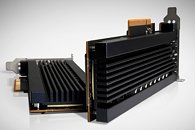Monday, March 20th 2017

Samsung's Z- SSD Featuring Z-NAND Makes a Physical Appearance
NAND has come here to stay, and it's market penetration still has a lot of leeway. Samsung, bar none the biggest and best player in the NAND field, is in a uniquely privileged position to develop new technologies and capitalize on them. Remember that Samsung has so many distinct product lines on which to monetize its advancements that any new investment is hardly a make it or break it affair.
Z-NAND is Samsung's answer to other developing technologies such as 3D XPoint, of which Intel has just announced the first commercial product. Z-NAND looks to stand at the intersection between NAND and DRAM, and is more of an evolution of the NAND design than it is a totally new technology (thus distancing itself from the likes of 3D XPoint.)Not all of the secret sauce is found on the Z-NAND dies: some of it is in a new controller of which there still are no specifications, which also allows for latency (presumably read latency) that will be 70% lower than current NVMe drives. The pictured Z-SSD, which has already begun sampling to customers, carries 800 GB capacity, and makes use of the PCIe 4x lanes to transmit data. Samsung lists tremendous sequential read and write speeds at up to 3200 Gbps, though its random speeds come in at a much more mundane 750K read and 160K write IOPS. No pricing or availability details are known, though it is expected that these drives will eventually come in at 1 TB, 2 TB, and 4 TB capacities.
Source:
AnandTech
Z-NAND is Samsung's answer to other developing technologies such as 3D XPoint, of which Intel has just announced the first commercial product. Z-NAND looks to stand at the intersection between NAND and DRAM, and is more of an evolution of the NAND design than it is a totally new technology (thus distancing itself from the likes of 3D XPoint.)Not all of the secret sauce is found on the Z-NAND dies: some of it is in a new controller of which there still are no specifications, which also allows for latency (presumably read latency) that will be 70% lower than current NVMe drives. The pictured Z-SSD, which has already begun sampling to customers, carries 800 GB capacity, and makes use of the PCIe 4x lanes to transmit data. Samsung lists tremendous sequential read and write speeds at up to 3200 Gbps, though its random speeds come in at a much more mundane 750K read and 160K write IOPS. No pricing or availability details are known, though it is expected that these drives will eventually come in at 1 TB, 2 TB, and 4 TB capacities.



19 Comments on Samsung's Z- SSD Featuring Z-NAND Makes a Physical Appearance
That said, I am one of those guys who looks for his cellphone for a full minute before realizing he's holding it, so..
Damn.
And then "improved ...price"... Yep! But I believe from the sellers point of view!
No more kidneys left...
typo. :)